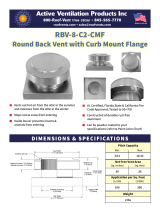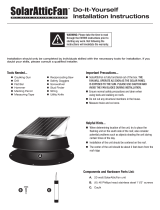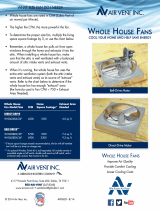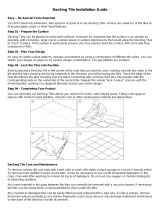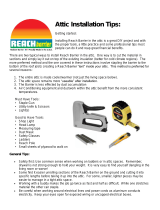Page is loading ...

SEE // HEAR // FEEL
THE QUIETCOOL DIFFERENCE
ADVANCED WHOLE HOUSE FANS
®
THE NATURAL CHOICE FOR ENERGY SAVINGS!
OWNER’S GUIDE
ROOF MOUNT MODELS
DO NOT THROW AWAY! SERIAL NUMBER FOR FAN IS LOCATED ON
BACK COVER OF OWNER’S GUIDE. RETAIN IN A SAFE PLACE.

2
QUIETCOOLSYSTEMS.COM
QUIETCOOLSYSTEMS.COM
GENERAL SAFETY INSTRUCTIONS
1. Read Instructions - All safety and operation instructions must be read. Failure to read and follow
instructions as stated in this guide may void applicable warranty.
2. Retain Instructions - The safety and operating instructions should be kept for future reference.
3. Heed Warnings - All warnings should be followed.
4. Follow Instructions - All installation and operating instructions should be followed.
5. Heat - The QuietCool system should be situated away from heat sources.
6. Damage Requiring Service - Only qualified service personnel should service the QuietCool system.
The user should not attempt to service the product.
7. Building Codes - Always follow Local Building Codes when installing appliances
CONTENTS
1. SYSTEM OVERVIEW ..............................................................1
1.1 Introduction ..............................................................1
1.2 Features .................................................................1
1.3 System Venting Requirements .............................................2
2. INSTALLATION ..................................................................3
2.1 Installing AFR Model Fans .................................................3
2.2 Installing RM Model Fans .................................................5
3. WIRING .........................................................................8
3.1 Specialty Fan Wiring - Smart ...............................................8
3.2 Specialty Fan Wiring - Thermostat (Robert Shaw) ...........................9
3.3 Specialty Fan Wiring - Timer ..............................................10
4. SYSTEM OPERATING INSTRUCTIONS ...........................................11
4.1 QuietCool Smart Attic Fan ................................................11
4.2 QuietCool Roof Mount Fans ...............................................11
WARRANTY .......................................................................13
ADVANCED WHOLE HOUSE FANS
®
QC Manufacturing, Inc.
43352 Business Park Drive
Temecula, CA 92590
PH 951.325.6340
FX 951.325.6351
QuietCoolSystems.com

3
1-888-QUIETCOOL
1
1-888-QUIETCOOL
1. SYSTEM OVERVIEW
1.1 INTRODUCTION
Congratulations on the purchase of your new QuietCool Specialty Series Fan!
The QuietCool Specialty Series was designed for every application imaginable. QuietCool Specialty Series
fans dominate the market in energy efficiency. Our Specialty Series works great in practically all climate
zones and most homes, mobile homes, and even warehouse buildings!
The QuietCool Roof Mount Fans offer great versatility for any system you are looking to put in. QuietCool Roof
Mount Fans can be used as an attic fan, as a whole house fan with a duct, or as a whole house fan that pulls
air through air intake grilles in multiple rooms.
New for 2018, we offer a smart roof mount attic fan. The AFR SMT-2.0 is the first roof mount smart attic fan
on the maket, and the most energy efficient too!
1.2 Series Features
• High Efficiency Design
• Designed and Built in California
• 15 Year Warranty
• Attic Fan (AFR SMT-2.0)
• Roof Mount Fans (RM ES-1100, RM ES-2200)

2
QUIETCOOLSYSTEMS.COM
1.3 System Venting Requirements
VERY IMPORTANT! - 1 SQUARE FOOT OF NET FREE VENT AREA PER 750 CFM
RECOMMENDED! - 2 TO 4 SQUARE FEET OF INLET VENTS PER FAN
Venting plays a very significant role in the performace of QuietCool fans. QuietCool recommends a minimum of
1 SQ. FT. of venting for every 750 CFM in the QuietCool system. If an attic has at least 1:750 attic venting, the
QuietCool system will operate efficiently and effectively. If an attic has less than 1:750 attic venting, the
system may not operate as efficiently, or effectively, as it could with 1:750 attic venting. But don’t worry, the
system will still operate if there is not enough venting.
Insufficient venting is a very simple problem to fix. Roofing contractors can add extra venting to most homes
simply and easily. The most common types of venting is shown in the chart below.
Vent Type Model Type Average Size Venting Sq. Ft.
Gable vent 12” x 19.5” 1.20
Dormer Vent 14” x 8” 0.70
Eave Vent
4”
5”
6”
0.03
0.04
0.07
Ridge Vent 4’ - 12’ 0.125 per ft
Soffit Vent
16” x 4”
16” x 6”
16” x 8”
0.19
0.29
0.39
O’Hagin Vent
Low/Medium Profile
Tapered Low Profile
Low Profile Flat
High Profile
0.5
0.6
0.68
0.68
Turbine Vent
8”
12”
14”
.35
.79
1.1
*Note: This table is only a guideline and is not a guarantee of venting capacity.

3
1-888-QUIETCOOL
Choosing the Right Location
Choose a location to install your QuietCool roof mounted fan that allows for balanced airflow throughout
the attic space. We always recommend the fan to be installed centrally located on the roof three feet
below the ridge line. This will allow you to access the fan very easily. Your roof mount fan should not be
installed any closer than within 5 feet to an existing passive vent, ridge vent, or additional fan unit.
IMPORTANT: DO NOT CUT THROUGH ANY RAFTERS OR STRUCTURAL MEMBERS WHILE CUTTING THE VENT
HOLE. ONLY CUT OUT THE ROOF DECKING.
2. INSTALLATION
2.2 Installing AFR (Attic Fan Roof) model fans
1. Determine in which area you would like to install your QuietCool Attic Roof Mount Fan.
IMPORTANT: After choosing the location where your roof mount attic fan will be installed, find the
closest rafter to that location and determine if your roof has either 16” on center or 24” on center
rafter spacing.
Installation Video:
Watch the video by
scanning the QR
code or visit www.
QuietCoolSystems.com/
support
READ BEFORE ATTEMPTING TO INSTALL AN AFR OR RM FAN
Getting Started
Always follow Local Building Codes because the fan may require specific fasteners or anchoring systems
not discussed in this installation guide. Installation should be done by a licensed roofing contractor.
Safety Information
Safety precautions should be taken when performing the roofing work described in this installation
guide. You can significantly reduce your risk of danger by following the below recommendations:
• Do not install the fan in wet or windy conditions
• Tie-off both yourself and your equipment when working on steep pitched roofs to avoid falls
• Wear safety glasses and protective gloves when using power tools
• Always wear slip-resistant shoes when working on the roof
• Do not cut through any rafters or structural members of the roof during installation
Ventilation Requirements
If the fan is being installed as an attic fan, in order for it to operate at maximum performance, your attic
must have enough intake ventilation (net free area) to support the amount of air that your fan is moving.
We always recommend 1 SQFT of attic venting per 750 CFM in the system.
Materials Needed
• Cordless Drill with Nut
Driver
• Self-Tapping Screws with
Rubber Bonded Washers
• Reciprocating Saw
• Measuring Tape
• Weatherproof Roofing
Grade Sealant
• Roofing Knife
• Ladder Marker or Carpenter
Pencil

4
QUIETCOOLSYSTEMS.COM
2. Find the center point between the two rafters and mark it as the center of the vent hole. Partially insert
a screw into the center point mark.
NOTE: If you have a tile roof, you will need to move the tiles out of the way before tracing and cutting.
(See Figure 2.2A)
3. Go to the roof. Using the screw as a reference point, trace out a 16” diameter circle.
4. Use a reciprocating saw to cut out the traced hole pattern from the roof decking. Remove the cut out
decking material from around the hole as needed. (See Figure 2.2B)
5. If you have a shingle roof, insert the reciprocating saw sideways between the shingles and roof decking.
Starting at the 3 o’clock position of the vent hole, begin cutting in a sweeping motion under the shingles,
cutting through any roofing nails or staples. Continue cutting counterclockwise around the vent hole
until reaching the 9 o’clock position. Using a roofing knife, cut a 4 inch horizontal slit in the shingles at
the 9 o’clock and 3 o’clock positions of the hole, allowing the fan’s flashing to slide underneath the
shingles.
6. Apply weatherproof material to the roof. (See Figure 2.2C)
7. Position the fan so that it is centered with the vent hole and allow the power cord to hang freely from
the bottom of the fan unit. The power cord comes in 20 ft length. Make sure your fan is close enough to
an outlet in your attic. (See Figure 2.2D)
8. Lifting the fan unit up at an angle, apply weatherproof caulking to the bottom side of the fan unit. This
will help keep the fan in place and will seal nice and tight.
Figure 2.2A Figure 2.2B Figure 2.2C
Figure 2.2D Figure 2.2E Figure 2.2F

5
1-888-QUIETCOOL
9. With all fan cables connected and hanging inside the vent hole, slide the fan unit underneath the shingles until
the fan reaches the top of the hole. Secure the fan flashing to the roof. Finish caulking around the fan and
flashing it into the roof to make a nice seal. (See Figure 2.2E)
10. Your install is complete! (See Figure 2.2F)
2.3 Installing RM (Roof Mount) model fans
1. Determine in which area you would like to install your QuietCool Roof Mount Fan. (See Figure 2.3A on pg. 7 for
assistance in figuring out how to install the fan)
IMPORTANT: After choosing the location where your roof mount attic fan will be installed, find the
closest rafter to that location and determine if your roof has either 16” on center or 24” on center
rafter spacing.
IMPORTANT: If you are installing the RM fan as a ducted fan, it’s time to find the exact location for
your ceiling box and grille using a stud finder. Locate the wall studs and mark the location for the
box to be installed. Minimum of 20” clearance required. Make sure the duct will fit between the fan
location and the ceiling box location. Using a drywall saw, cut out the drywall.
2. Find the center point between the two rafters and mark it as the center of the vent hole. Partially insert a
screw into the center point mark.
NOTE: If you have a tile roof, you will need to move the tiles out of the way before tracing and
cutting. (See Figure 2.24)
3. Go to the roof. Using the screw as a reference point, trace out either a 14” (RM ES-1100) or 16” (RM ES-2200)
diameter circle. NOTE: The RM ES-2200 will only fit 24” on center.
4. Use a reciprocating saw to cut out the traced hole pattern from the roof decking. Remove the cut out decking
material from around the hole as needed. (See Figure 2.2B on pg. 4)
5. If you have a shingle roof, insert the reciprocating saw sideways between the shingles and roof decking.
Starting at the 3 o’clock position of the vent hole, begin cutting in a sweeping motion under the shingles,
cutting through any roofing nails or staples. Continue cutting counterclockwise around the vent hole until
reaching the 9 o’clock position. Using a roofing knife, cut a 4 inch horizontal slit in the shingles at the 9 o’clock
and 3 o’clock positions of the hole, allowing the fan’s flashing to slide underneath the shingles.
6. Apply weatherproof material to the roof. (See Figure 2.2C on pg. 4)
7. Position the fan so that it is centered with the vent hole and allow the power cord to hang freely from the
bottom of the fan unit. The power cord comes in 20 ft length. Make sure your fan is close enough to an outlet
in your attic. (See Figure 2.2D on pg. 4)

6
QUIETCOOLSYSTEMS.COM
7. Lifting the fan unit up at an angle, apply weatherproof caulking to the bottom side of the fan unit. This will
help keep the fan in place and will seal nice and tight.
8. With all fan cables connected and hanging inside the vent hole, slide the fan unit underneath the shingles
until the fan reaches the top of the hole. Secure the fan flashing to the roof. Finish caulking around the fan
and flashing it into the roof to make a nice seal. (See Figure 2.2E on pg. 4)
IMPORTANT: If installing as an attic fan, you are done!
IMPORTANT: If you are installing the RM fan in a flat or sloped ceiling application without duct,
find the location for your ceiling box and grille using a stud finder. Locate the wall studs and mark
the location for the box to be installed (Figure 2.3B). Using a drywall saw, cut out the drywall
(Figure 2.3C) Place the ceiling box (if applicable) over the ceiling cut out (Figure 2.3D). Attach the
ceiling box using screws into the ceiling joists. (Figure 2.3E) Install the ceiling grille. (Figure 2.3F)
IMPORTANT: If you are installing the RM fan in a flat or sloped ceiling application without duct,
find the location for your ceiling box and grille using a stud finder. Locate the wall studs and mark
the location for the box to be installed (Figure 2.3B). Using a drywall saw, cut out the drywall
(Figure 2.3C) Place the ceiling box (if applicable) over the ceiling cut out (Figure 2.3D). Attach the
ceiling box using screws into the ceiling joists. (Figure 2.3E) Install the ceiling grille. (Figure 2.3F)
Connect the duct from the ceiling box to the fan unit.
Figure 2.3B
Figure 2.3C Figure 2.3D
Figure 2.3E Figure 2.3F

7
1-888-QUIETCOOL
Figure 2.3A: Roof Mount Application Diagrams
Flat Roof - No Duct: Works with CRB and FLT Models
Sloped Roof - No Duct: Works with SLP Models
Flat Roof - With Duct: Works with CRB and FLT Models
Sloped Roof - With Duct: Works with SLP Models
EXTREMELY IMPORTANT: It is very important that you install the RM fans correctly, as shown in
the following diagrams, as it will dramatically affect the sound level of the fan. NEVER install the
ceiling grille directly underneath the fan. Always offset at least two feet.

8
QUIETCOOLSYSTEMS.COM
3. WIRING
NOTE: Wiring Diagrams are for examples ONLY. Wiring should be done by an experienced
electrician.
NOTE: Your fan may have come with the thermostat pre-wired to a power cord. If this is the case,
simply mount the thermostat or junction box, find a power source in your attic, and plug the
fan in. If you would like to hard-wire the fan, or it is required by your local building codes, please
follow the wiring instructions below.
3.1. Specialty Fan Wiring - Smart (AFR SMT-2.0)
If you purchased a specialty fan with a smart motor, the fan has the thermostat and humidistat built into the motor.
This makes the installation extremely simply.
1. For this installation, you will need a 2 wire Romex.
2. Open up the junction box from the fan. Remove the power cord. Bring your 2 wire Romex from the power
source into the junction box.
3. With a wire nut, tie the white common wire together. Then tie the black wires together.
4. Ground the green wire from the fan and the ground wire from the Romex to the junction box.
NOTE: When the Smart Attic Fan is connected to power for the first time, it will start in test mode.
It will run for 60 seconds to ensure it runs properly. After 60 seconds, if the temperature is in
operating range (as shown on page 11), the fan will continue to run. If the temperature is not in
operating range, the fan will shut off. If the fan does not come on the first time it is connected to
power, there may be a problem with the wiring. Please contact us if you have any issues.
Figure 3.1A: Smart Attic Fan at the Junction Box
Ground the fan to the junction box
using the green ground screw
Specialty Series Fan
Junction
Box
Power Source
14-2 Wire
14-2 Wire
ADVANCED ATTIC GABLE FANS
®
Ground the fan to the junction box
using the green ground screw
Specialty Series Fan
Junction
Box
Power Source
14-2 Wire
14-2 Wire
ADVANCED ATTIC GABLE FANS
®

9
1-888-QUIETCOOL
3.2 Specialty Fan Wiring - Thermostat (RM ES-1100, RM ES-2200)
For wiring of a Specialty Series Fan with a Robert Shaw thermostat. This wiring method works with our RM models
but we do not recommend using it with a RM model fan that is being used as a whole house fan. (See 3.2A wiring
diagram)
1. Mount a junction box for your thermostat in the best location for thermostat readings which is usually on
the wall next to the light switch or garage door opener in the garage. Begin wiring the thermostat.
2. With a 3 wire Romex, tie the black wire to the black wire from the thermostat.
3. Tape the white common wire on both sides of the 3 wire Romex because we will be using this as our
switch leg.
4. Tie the red wire and the taped white wire together.
5. Attach the ground wire to the ground screw on the timer.
6. In the fan’s junction box, tie the black wire from the fan to the taped white wire.
7. Tie the two remaining black wires together. Then, tie the remaining copper wires together.
Figure 3.2A
Ground the fan to the junction box
using the green ground screw
Specialty Series Fan
Junction
Box
Power Source
14-2 Wire
14-2 Wire
14-2 Wire
60°
Thermostat
FAN ON
TEMPERATURE
90°
120°
®
ADJUSTABLE
TEMPERATURE THERMOSTAT
CAUTION
Automatically started device - to reduce the
risk of injury disconnect from power supply
before servicing. For residential use only. See
instructions for wiring diagram.
60°
ADVANCED ATTIC GABLE FANS
®
Ground the fan to the junction box
using the green ground screw
Specialty Series Fan
Junction
Box
Power Source
14-2 Wire
14-2 Wire
14-2 Wire
60°
Thermostat
FAN ON
TEMPERATURE
90°
120°
®
ADJUSTABLE
TEMPERATURE THERMOSTAT
CAUTION
Automatically started device - to reduce the
risk of injury disconnect from power supply
before servicing. For residential use only. See
instructions for wiring diagram.
60°
ADVANCED ATTIC GABLE FANS
®

10
QUIETCOOLSYSTEMS.COM
3.3 Specialty Fan Wiring - Timer
For wiring of a Specialty Series Fan with a timer. This wiring method works with all of our Specialty Series fans.
1. For this installation, you will need a 2 & 3 wire Romex, and an 8 Hour Timer.
2. Begin wiring the timer. From your 3 wire Romex, using a wire nut, tie the two red wires together, the
two white wires together, the two black wires together, and the two ground wires together.
3. Open up the junction box that is connected to the fan. Bring your 2 wire and 3 wire into the junction
box.
4. Tie the white common wires from the fan, the power source, and the timer together. Then, using the
green ground screw, ground the green wire from the fan to the handy box.
5. With a wire nut, tie the black wire from the fan to the red wire from the timer.
6. Then, tie the black wire from the power source to the black wire from the timer.
7. Lastly, tie the copper ground wire from the power source to the copper ground wire from the timer.
Figure 3.3A
Ground the fan to the junction box
using the green ground screw
Specialty Series Fan
Junction
Box
Power
Source
14-2 Wire
14-2 Wire
8 HOUR
4 HOUR
2 HOUR
1 HOUR
HOLD
Bare Copper Wires Tied
Together
Match Wire
Colors Together
14-3 Wire
ADVANCED ATTIC GABLE FANS
®
Ground the fan to the junction box
using the green ground screw
Specialty Series Fan
Junction
Box
Power
Source
14-2 Wire
14-2 Wire
8 HOUR
4 HOUR
2 HOUR
1 HOUR
HOLD
Bare Copper Wires Tied
Together
Match Wire
Colors Together
14-3 Wire
ADVANCED ATTIC GABLE FANS
®

11
1-888-QUIETCOOL
4. SYSTEM OPERATING INSTRUCTIONS
4.1 QuietCool Smart Attic Fan (AFR SMT-2.0)
QuietCool Attic Fans work almost everywhere, anytime. During the summer, an attic can be 40-50 degrees hotter
than the outside temperature, which in turn heats up the house much faster. With an attic fan, you can cool the
attic to the same temperature as it is outside, greatly reducing the house from heating as quickly.
With the QuietCool Smart Attic Fan, gone are the days of having to adjust the thermostat for your attic fan.
Featuring a built-in thermostat and humidistat, the self-adjusting, 10-speed ECM motor is always reading the
temperature and humidity in the attic.
When the fan detects temperature over 80 degrees, or humidity over 60%, the Smart Attic Fan comes on at the
lowest speed. As the attic starts to heat up, the Smart Attic Fan automatically adjusts it’s speed.
AFR SMT-2.0 Attic Fan - Roof
Temp. 80° 85° 90° 95° 100° 105° 110° 115° 120° 125°+
Humidity 60%+ N/A N/A N/A N/A N/A N/A N/A N/A N/A
Speed 1 2 3 4 5 6 7 8 9 10
CFM 743 1015 1118 1273 1427 1557 1731 1840 2030 2116
Watts 15 26 35 47 62 81 104 129 159 170
*All specs are approximate. For the most up-to-date specs, please visit QuietCoolSystems.com
The QuietCool Smart Attic Fan will help your attic stay cooler than with a traditional single-speed attic fan, and
will help save you energy by running the fan at a lower speed (thus a lower wattage) when the attic is not
as hot.
4.4 QuietCool Roof Mount Fans (RM ES-1100 and RM ES-2200)
The QuietCool (RM) Roof Mount Fans are the most versatile fans that we offer. They can be used as an attic fan,
a whole house fan with a duct, or a whole house fan with multiple inlet vents. QuietCool Roof Mount Fans also
work where a conventional QuietCool Whole House Fan will not. Roof Mount fans work with homes that have a
sealed attic, manufactured homes with no attic, homes with cathedral ceilings, and even industrial buildings
such as warehouses.
If you installed your Roof Mount as a whole house fan, run the fan when it is cooler outside than it is inside your
home. Be sure to crack open a few select windows in your home and let the Roof Mount fan do the rest.
If you installed your Roof Mount as an attic fan, set your thermostat and let it run! When installed as an attic
fan, it is effective almost everywhere, almost anytime.

12
If you have any trouble installing or operating your new QuietCool Specialty Series Fan, please visit our website
at www.QuietCoolSystems.com or call us at 951-325-6340 for support.
QuietCool is Proudly Designed and Built in California

13
1-888-QUIETCOOL
SPECIALTY SERIES FANS LIMITED WARRANTY
15 YEAR LIMITED WARRANTY
PRODUCT INFORMATION
QC Serial # QC Serial #
QC Serial # QC Serial #
QUIETCOOL SPECIALTY SERIES FANS
QC Manufacturing Inc. extends this warranty to the original purchaser of the following QuietCool
Specialty Series Fans ---- AFG SMT-3.0, AFG PRO-3.0, AFR SMT-2.0, GA ES-1500, GX ES-1100, RM ES-1100,
RM ES-2200 ---- installed and used in a residence under normal conditions within the United States:
A. Fifteen year coverage applies to the QuietCool motor fan assembly. At our option we will repair or
replace any part of the assembly should it fail to operate during the first fifteen years from the
date of original purchase.
B. One year coverage for all other components including grills, housings, controls and accessories
furnished by QC Manufacturing Inc. At our option we will repair or replace any part which fails as a
result of defective material or workmanship during the rst year from the original date of purchase.
C.This warranty does not cover any of the following:
1. Incidental or consequential damage resulting from the operation of our equipment or any
malfunction thereof.
2. Cost of service calls to diagnose the cause of problems or the labor charge to un-install any
components.
3. Product failure or damage due to faulty installation, abuse, misuse, unauthorized alteration to
factory specs, lack of maintenance, or transportation damage.
4. Shipping or postage for warranty claims.
D. To obtain service under this warranty, contact the dealer where you purchased the equipment.
If you are unable to find or reach your dealer, contact Customer Service at QC Manufacturing, Inc.,
at the number below
This warranty is the only warranty extended by QC Manufacturing, Inc. to purchasers or suppliers of our equipment. QC Manufacturing Inc. disclaims all other
warranties, express or implied, that arise by operation of the law.
Rev.6.5.17
E. Registration is no longer required for QuietCool fans. If service is required under this warranty,
you must retain your proof or purchase.
ADVANCED WHOLE HOUSE FANS
®
MAKERS OF THE QUIETCOOL ADVANCED WHOLE HOUSE FAN
Rev. 3/20/18
/

